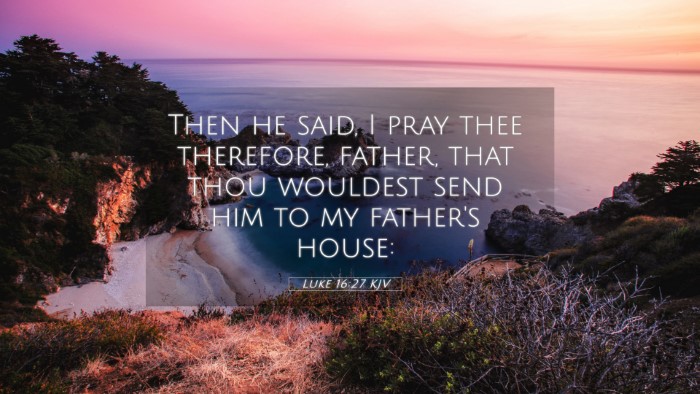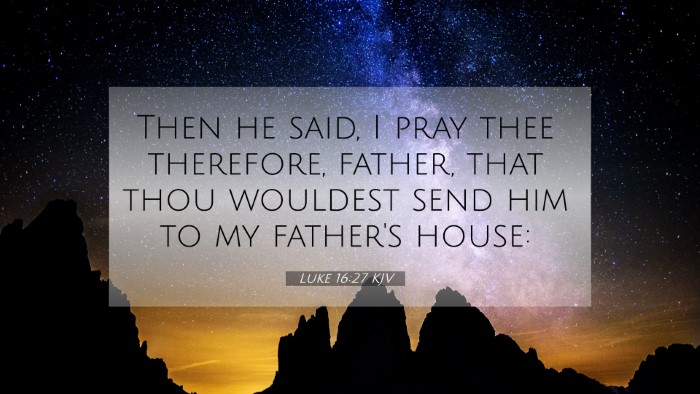Understanding Luke 16:27
Luke 16:27 states: "And he said, I pray thee therefore, father, that thou wouldest send him to my father's house."
General Context
This verse is part of the parable of the rich man and Lazarus, where Jesus illustrates the eternal consequences of earthly choices. The rich man, after his death, finds himself in torment and seeks mercy, asking Abraham to send Lazarus to warn his family.
Commentary Insights
- Matthew Henry:
Henry emphasizes the desperation of the rich man who, despite his previous ignorance of spiritual truths, now recognizes the reality of his situation. His plea reflects a concern for his family’s salvation, indicating the awareness of his own eternal suffering.
- Albert Barnes:
Barnes discusses the implications of the rich man's request. He highlights that the rich man's understanding of spiritual matters was awakened only in his suffering, which serves as a lesson to those who ignore faith and the ads of mercy in their earthly lives.
- Adam Clarke:
Clarke notes that the rich man's desire to send Lazarus points to a misunderstanding of spiritual authority. He assumes a supernatural intervention should occur to save his family—a clear illustration of the futility of neglecting God's prior invitations to repentance.
The Core Themes
- Interceding for Others:
The rich man's plea highlights the weight of intercessory prayer, as individuals bear a responsibility for their family’s spiritual well-being.
- The Nature of Repentance:
This verse illustrates a profound truth about repentance; it cannot be forced through miraculous signs but comes from personal conviction and humility.
- The Finality of Choice:
Once in eternity, the choices made in life cannot be altered; the rich man realizes there are no second chances.
Cross-Referencing Biblical Texts
To deepen your understanding, we can identify several cross-referenced scriptures that relate to Luke 16:27:
- Luke 16:19-25: The entire narrative of the rich man and Lazarus provides essential context for understanding the consequences of their choices.
- Matthew 5:7: "Blessed are the merciful: for they shall obtain mercy." This highlights the contrast between the rich man's life and the mercy he now seeks.
- Romans 10:14-15: Emphasizes the importance of preaching and hearing the word of God so that people may come to faith.
- John 5:28-29: Discusses the resurrection of the dead, raising awareness about eternal judgment and rewards.
- Revelation 20:12: Gives insight into the final judgment, causing one to consider the weight of actions in life.
- Hebrews 9:27: "And as it is appointed unto men once to die, but after this the judgment." This reinforces the urgency of life decisions.
- Luke 12:51-53: Highlights the division that following Christ may cause, which supports the notion of individual accountability.
Tools for Cross-Referencing
Using tools for Bible cross-referencing can enrich your study. Consider these approaches:
- Bible Concordance: A comprehensive tool to find verses related by themes or keywords.
- Online Cross-Reference Guides: Could include various connections across different translations and interpretations.
- Bible Study Software: Some programs come with built-in cross-reference analytics.
Conclusion
Luke 16:27 underscores the gravity of choices made in this life, the reality of eternal consequences, and the critical nature of intercession. Reflecting on the interconnections within the scriptures helps deepen our understanding and enhances the spiritual insights we draw from these texts.


